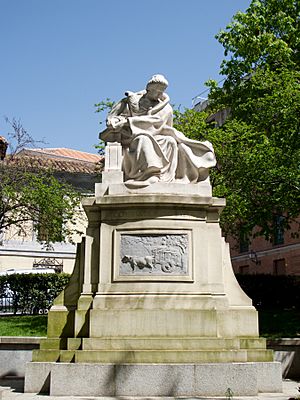Statue of Emilia Pardo Bazán (Madrid) facts for kids
The Statue of Emilia Pardo Bazán is a special piece of art you can see in Madrid, Spain. It stands near a street called Calle de la Princesa. This statue honors a very important Spanish writer named Emilia Pardo Bazán.
 |
|
| Coordinates | 40°25′35″N 3°42′46″W / 40.42631°N 3.712841°W |
|---|---|
| Location | Calle de la Princesa, Madrid, Spain |
| Designer | Rafael Vela (statue) Pedro Muguruza (plinth) |
| Material | Limestone, marble, granite |
| Opening date | 24 June 1926 |
| Dedicated to | Emilia Pardo Bazán |
Contents
Who Was Emilia Pardo Bazán?
Emilia Pardo Bazán was a famous Spanish writer. She lived from 1851 to 1921. She wrote many novels, short stories, and essays. Emilia was also a journalist and a professor. She was known for her strong opinions. She often wrote about women's rights. She believed women should have the same opportunities as men.
Why a Statue for Her?
After Emilia Pardo Bazán passed away in 1921, people wanted to honor her. A man named Eugenio Rodríguez Ruiz de la Escalera first suggested building a monument in Madrid. Many people thought this was a great idea.
How the Statue Was Made
To pay for the statue, people raised money. Women from Spain and Argentina helped collect donations. This was called a "popular subscription." It means many people gave small amounts of money. A noblewoman, María del Rosario de Silva, helped organize this effort.
The statue itself was carved by Rafael Vela del Castillo. It shows Emilia Pardo Bazán. The statue is made from a type of stone called limestone. The base, or "plinth," that the statue stands on was designed by Pedro Muguruza.
Unveiling the Monument
The monument was placed near the Palacio de Liria. This location was chosen because it was close to where Emilia Pardo Bazán lived in Madrid. Her home was on Calle de la Princesa.
The statue was officially revealed on June 24, 1926. King Alfonso XIII and Queen Victoria Eugenie attended the ceremony. Several important people gave speeches. These included Romanones and the Minister of Public Instruction.
Gardens of the Feminists
In March 2019, a local government group made a special decision. They voted to name the gardens around the statue Jardines de las Feministas. This means "Gardens of the Feminists." It honors Emilia Pardo Bazán's work for women's rights.
See also
 In Spanish: Monumento a Emilia Pardo Bazán (Madrid) para niños
In Spanish: Monumento a Emilia Pardo Bazán (Madrid) para niños
 | James Van Der Zee |
 | Alma Thomas |
 | Ellis Wilson |
 | Margaret Taylor-Burroughs |

